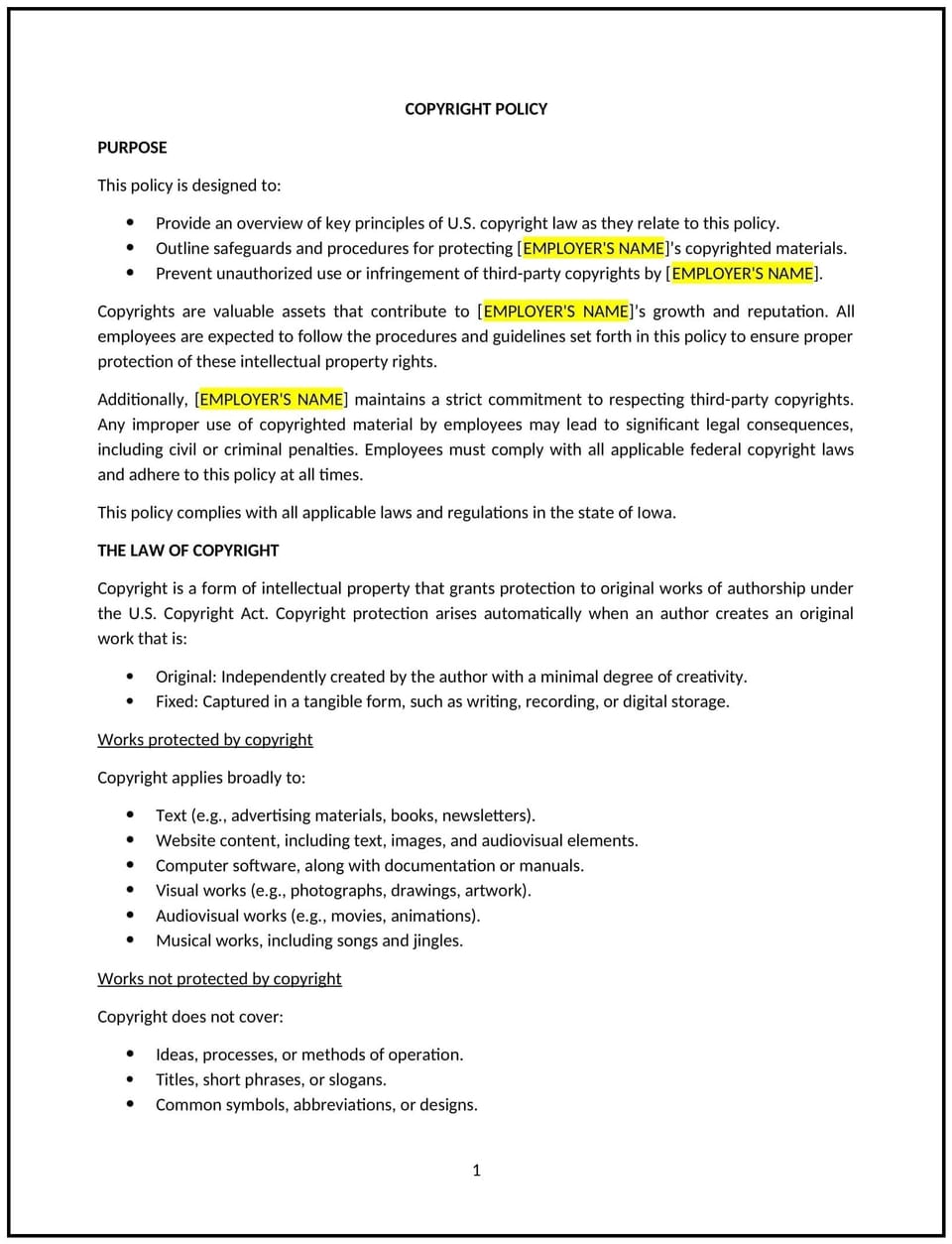Copyright policy (Iowa): Free template

Copyright policy (Iowa)
A copyright policy helps Iowa businesses establish guidelines for creating, using, and protecting copyrighted materials, including written content, images, software, and proprietary designs. Proper copyright management helps businesses safeguard intellectual property while avoiding infringement issues.
This policy outlines ownership rights, permitted use of third-party content, and best practices for handling copyrighted materials. It provides businesses with a structured approach to protecting their creative assets and respecting external intellectual property rights.
By implementing this policy, businesses in Iowa can reduce legal risks, encourage innovation, and ensure clarity in the use and distribution of copyrighted materials.
How to use this copyright policy (Iowa)
- Define copyright ownership: Clarify who owns the rights to intellectual property created by employees, contractors, or third parties.
- Establish usage guidelines: Specify how employees can use copyrighted materials, including company content and third-party resources.
- Address employee-created works: Determine whether works created during employment belong to the business or the individual.
- Require permissions and licenses: Outline procedures for obtaining rights to use copyrighted materials legally.
- Prevent unauthorized use: Prohibit employees from copying, distributing, or modifying copyrighted content without proper authorization.
- Establish reporting procedures: Provide steps for reporting suspected copyright violations or unauthorized use of company content.
- Implement copyright protection measures: Require businesses to register key intellectual property assets and use copyright notices when applicable.
- Review and update: Regularly assess copyright policies to align with evolving business needs and intellectual property laws.
Benefits of using this copyright policy (Iowa)
This policy offers several advantages for Iowa businesses:
- Protects intellectual property: Safeguards original content, designs, and creative works.
- Reduces infringement risks: Helps businesses avoid unauthorized use of third-party materials.
- Encourages responsible content use: Educates employees on legal and ethical content management.
- Strengthens brand integrity: Establishes guidelines for maintaining ownership of company-created materials.
- Supports innovation: Encourages businesses to develop and protect unique ideas and creative assets.
- Provides clear ownership rights: Defines how intellectual property created within the company is handled.
Tips for using this copyright policy (Iowa)
- Define intellectual property rights: Businesses should clarify ownership of content, software, and other creative works produced internally.
- Require proper attribution: Businesses should ensure that any use of third-party content includes appropriate credit and permissions.
- Establish internal review processes: Businesses should implement procedures for reviewing copyrighted content before publication.
- Protect digital assets: Businesses should use copyright notices and digital watermarks to prevent unauthorized copying.
- Educate employees on copyright laws: Businesses should provide training on intellectual property rights and content usage restrictions.
- Monitor for copyright violations: Businesses should periodically check for unauthorized use of company content online or in commercial settings.
Q: Why should Iowa businesses implement a copyright policy?
A: Businesses should establish this policy to protect their intellectual property, prevent unauthorized use of copyrighted content, and ensure responsible content management.
Q: What types of materials should businesses copyright?
A: Businesses should copyright original written content, branding materials, images, software, product designs, and any other creative assets.
Q: How should businesses handle employee-created content?
A: Businesses should define whether works created during employment belong to the company or the individual employee.
Q: What steps should businesses take to prevent copyright infringement?
A: Businesses should train employees on copyright laws, require permissions for third-party content, and monitor for unauthorized use of company assets.
Q: How can businesses register a copyright?
A: Businesses should file copyright registrations with the U.S. Copyright Office for added legal protection of creative works.
Q: What should businesses do if they suspect a copyright violation?
A: Businesses should investigate the issue, document unauthorized use, and take appropriate legal action if necessary.
Q: How often should businesses review their copyright policy?
A: Businesses should update the policy annually to reflect changes in copyright laws, business practices, and content usage needs.
Q: Can businesses use copyrighted content under fair use?
A: Businesses should evaluate fair use on a case-by-case basis and seek legal guidance before relying on fair use exemptions.
This article contains general legal information and does not contain legal advice. Cobrief is not a law firm or a substitute for an attorney or law firm. The law is complex and changes often. For legal advice, please ask a lawyer.


